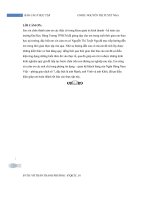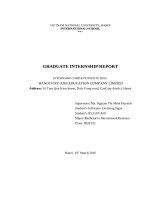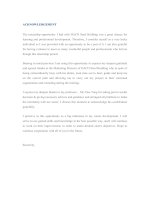báo cáo thực tập tiếng anh There are so many phrasal verbs in English, and they all look soconfusing. How should I go about learning phrasal verbs
Bạn đang xem bản rút gọn của tài liệu. Xem và tải ngay bản đầy đủ của tài liệu tại đây (200.56 KB, 28 trang )
Graduation paper
Phrasal Verbs in English
ACKNOWLEDGEMENTS
On the completion of this graduation paper, I am sincerely grateful to
many teachers who have helped, encouraged and supported me during 4
years in the Faculty of Foreign Languages of Dong Do University.
First of all, I would like to express my great thanks to all my teachers in
the Faculty of Foreign Languages of Dong Do University for their
interesting and useful lectures which gave me background knowledge of
English.
In addition, I owe a sincere thank to my Supervisor, Ms. Vu Thi Thuong
who has helped me to shape the ideas and guided me in different matters
related to the topic. Her continual encouragement and patient guidance
made my work easier.
Last but not least, my heartfelt thanks are to my family and all my dear
friends who have given me love, support and encouragement for the
completion of this graduation paper.
Without the help and support of these people, my graduation paper could
not have been done.
Nguyen Thi Thuong Lan
1
N14A2 - Dong Do University
Graduation paper
Phrasal Verbs in English
Part A: INTRODUCTION
1. Statement of the topic
Each language has its own character, developed by the countless
generations who have used it. In spoken English, phrasal verbs are the
most common verb forms, they have the importance that lies in the fact
that they form a key part of everyday English. Phrasal verbs are frequently
used by native speakers, especially in casual, laid-back spoken English.
The importance of multiword expression to gain fluency in language
learning has been asserted by many researchers.
In fact, phrasal verbs are often a particular problem for learners of English.
Many students generally find great differences between their English with
native speakers. When using unfamiliar phrasal verbs, a lot of students of
English, struggle with finding the right preposition. Unfortunately,
preposition usage does not follow the set rules so everything must be
memorized. Moreover, the meanings of a phrasal verb often have no
relation to the meaning of either verb or preposition which is used with it
and its meaning is often unpredictable.
In the process of learning English at Dong Do University, my studying
provides me with very basic and vital knowledge. Nevertheless, phrasal
verbs are paid little attention. Thus, the thesis paper is focus on the usage
of phrasal verbs and the way to study them effectively. Especially, I would
like to present the analysis of verb – particle combination regarding to the
structure of both verb and particle. As a student, I have little experience on
in – depth studies in grammatical field. My knowledge is just what I
Nguyen Thi Thuong Lan
2
N14A2 - Dong Do University
Graduation paper
Phrasal Verbs in English
obtained from the lessons in class, my teachers, books as well as any
information on the Internet. Hope that this is also helpful to the students
who would like to share ideas with other fellow students of the same
interest.
2. Reason for choosing the topic
As a big part of the English vocabulary is made up of phrasal verbs, if
students of English can learn and use common phrasal verbs, their
vocabulary will be bigger, their listening and reading comprehension will
improve, and their spoken English will be more fluent and native-like.
But "There are so many phrasal verbs in English, and they all look so
confusing. How should I go about learning phrasal verbs?" This is a
common question of the learners. But phrasal verbs are a specific kind of
verbs. Their meanings are mostly conceptual or even completely
idiomatic, there are no shortcuts to phrasal verbs. Learners have to
memorize them and try to use them as much as they can. The addition of
this difficulty is having to remember which particles must be used in
combination with certain verbs and their using of the wrong particles can
distort meanings and mark writing as non – native.
Darwin and Gray (1999) noted that the students prefer using a single to a
multiword verb; consequently, they tend to avoid phrasal verbs. The
reason is simply that it takes time to store so many verb – particle
constructions without any definite rules. Moreover, the teachers also put
off teaching phrasal verbs until the students are at highly advanced level.
However, no one can deny the crucial role of phrasal verbs in the English
Nguyen Thi Thuong Lan
3
N14A2 - Dong Do University
Graduation paper
Phrasal Verbs in English
language. Exploring phrasal verbs in English is one of the main factors
which denote a true, colloquial speaker of English.
Therefore, this thesis is to help students face with the challenge and enable
them to take the most advantage of it. This makes a small contribution,
especially with regard to the usages and types of phrasal verbs. In fact, do
not worry about phrasal verbs, call them whatever you want. The most
important thing is that you should understand as many phrasal verbs as
possible and be able to use them. For meanings or equivalent ‘normal’
verbs, you will need to buy a good dictionary or a phrasal verb grammar
book. Hopefully, this thesis works well to everyone.
3. Aims of study
It is obvious that foreign learners have many difficulties in understanding
and using phrasal verbs in English. With my understanding, I would like to
give some information about this matter. The specific aims of study are to:
• Bring the most basic information on phrasal verbs in English.
• Help learners understand types of phrasal verbs.
• Guide them to use phrasl verbs effectiverly and provide them some
tips on learning phrasal verbs.
In short, I hope my graduation paper will provide more useful information
for all people who want to expand their knowledge about phrasal verbs,
especially English learners.
Nguyen Thi Thuong Lan
4
N14A2 - Dong Do University
Graduation paper
Phrasal Verbs in English
4. Methods of study
To finish this thesis, I have based on three main methods: synthetic, list,
analysis.
Firstly is Synthetic method. This means collecting informations about
phrasal verbs from many reliable book such as: “Oxford phrasal verbs” of
Oxford University Press, “Longman Student Grammar of Spoken and
Written English”… and on the internet then gathered together.
Secondly, it is listing method. I have listed many examples that I took
from books, internet and from my knowledges in university in this thesis.
Lastly, analysis method. After collecting and listing the informations and
examples, they are all analyzed for readers easy to undertand.
5. Outline of the paper
The paper consists of three main parts:
Part A – INTRODUCTION, it deals with the statement of the topic, the
reason for choosing topic and the outline of the paper.
Part B – DEVELOPMENT, it mentions to overview of phrasal verbs,
types of phrasal verbs and guides to use phrasal verbs
Part C – CONCLUSION, it gives summary of the thesis, remarks and
suggestions.
APPENDIX is added at the end of this paper to supply some exercises
about phrasal verbs, key to exercises and references
Part B: DEVELOPMENT
Nguyen Thi Thuong Lan
5
N14A2 - Dong Do University
Graduation paper
Phrasal Verbs in English
Chapter 1: OVERVIEW OF THE PHRASAL VERBS
I. What are the phrasal verbs?
1. Definition
In English, there is one particular aspect of the grammar and vocabulary:
combinations of two (sometimes three) parts; verbs with an adverbial or
prepositional particles. It can be a core verb plus one or two particles.
They are extremely common in English and these combinations are
generally called phrasal verbs.
E.g. Fortunately, the plan came off. (= succeeded)
Why did you turn down such a good offer? (= refuse)
I can’t make out if it’s a man or women over there. (= see clearly)
2. Identifying phrasal verbs
A phrasal verb is formed by a verb with a preposition, a verb with an
adverb, or a verb with both an adverb and a preposition.
• Verb + adverb:
Take off
=
Leave quickly, fly away
• Verb + preposition:
Come across
=
Find by chance
• Verb + adverb + preposition
Look down on =
Think little and scorn
II. Difficulties in learning phrasal verbs
Nguyen Thi Thuong Lan
6
N14A2 - Dong Do University
Graduation paper
Phrasal Verbs in English
1. Difficult to understand meanings
In many cases, even though both the verb and the particles in the phrasal
verb may be familiar, students may not understand the meaning of the
combination, since it can differ from the meanings of the two words used
independently. The fact that phrasal verbs often have a number of different
meanings adds to their complexity.
2. Grammatical problems
Some particles, such as about, over, round and through can be used as
both adverbs and prepositions in particular phrasal verbs combinations,
although in other combinations they are used either adverbially or
prepositionally.
Some phrasal verbs are not normally used with pronouns as objects, others
are normally only used with pronouns as objects.
3. Phrasal verbs tend to be informal
It is often said that phrasal verbs tend to be rather ‘colloquial’ of
‘informal’ and more appropriate to spoken English than written, and even
that it is better to avoid them and choose single-word equivalents or
synonyms instead
Nguyen Thi Thuong Lan
7
N14A2 - Dong Do University
Graduation paper
Phrasal Verbs in English
III. Phrasal verb misunderstanding
1. Phrasal Verbs and other multi-word verbs
1.1. A basic verb + another word or words
The important thing to remember is that a multi-word verb is still a verb.
"Get" is a verb. "Get up", is also a verb, a different verb. "Get" and "Get
up" are two different verbs. They do not have the same meaning. So you
should treat each multi-word verb as a separate verb, and learn it like any
other verb.
1.2. Verb + preposition phrase combinations
Many verb + preposition phrase combinations are idiomatic. Such
combinations function semantically as a unit that can often be replaced by a
single lexical verb, as in the following sentence:
E.g. I also have to bear in mind the interests of my wife and family.
(= remember)
1.3. Verb + verb combinations
A second idiomatic category involves verb + verb combinations, such as:
E.g. Patients had to make do with quiche or ham salad.
1.4. Verb + noun phrase combinations
There are a few verbs such as: take, make, have and do that can be used for
many meanings. These verbs cam combine with noun phrases to form
idiomatic verbal expressions. In many cases, the combination also includes a
following preposition.
Nguyen Thi Thuong Lan
8
N14A2 - Dong Do University
Graduation paper
Phrasal Verbs in English
E.g. Do you want me to do your hair?
Yes, I’ll take care of it.
2. Phrasal verbs and idioms.
Many phrasal verbs have idiom meanings, they are called idiomatic
phrasal verbs. That is, the meaning of the whole verb is not related to the
meaning of the parts of the verb. So we always misunderstand and think
that all the phrasal verbs are idioms.
E.g. She opened her suitcase and packed all the clothes in (Literal
meaning)
He decided to pack his job in (leave his job) (Idiom meaning)
Nguyen Thi Thuong Lan
9
N14A2 - Dong Do University
Graduation paper
Phrasal Verbs in English
Chapter 2: TYPES OF PHRASAL VERBS
I. Dividing by semantic
1. Literal phrasal verbs
Literal phrasal verbs are the most commonly, their structure include verbs
+ directional prepositions. Here are some examples:
Go ahead
=
Come back
Proceed
=
Return
2. Aspectual phrasal verbs
Aspectual are phrasal verbs whose meaning is not as transparent as literal
phrasal verbs, but the meaning is not idiomatic either.
E.g. Get over
Flame out
=
Go to a place
=
Fail
3. Idiomatic phrasal verbs
Idiomatic phrasal verbs are phrasal verbs whose meanings are idiom and
their whole meanings are different from the meaning of verbs or
prepositions.
E.g. Follow up
=
Take further action about something
Pass away
=
Die
4. Polysemous phrasal verbs
The final semantic category of phrasal verbs called polysemous which can
have multiple meanings.
E.g. Pick up
=
Become better
=
Obtain or buy something
Nguyen Thi Thuong Lan
10
N14A2 - Dong Do University
Graduation paper
Phrasal Verbs in English
=
Collect things
II. Dividing by structure
I. Intransitive phrasal verbs
• Structure: Verb + Particle
Intransitive phrasal verbs are phrasal verbs that are not followed by an
object.
E.g. Shut up! Just forget it. (Conversation)
Go off to bed now. (Conversation)
II. Transitive phrasal verbs
Transitive phrasal verbs are phrasal verbs that must take direct objects.
They are more evenly spread across written and spoken registers. Phrasal
verbs which take objects can be separable or inseparable and they can be
divided into 4 types.
1. Inseparable transitive phrasal verbs
• Structure: Verb + Particle + Object
Come across
=
Discover
Get in
=
Enter
In the following table, we can see correct example and incorrect examples
of inseparable phrasal verbs:
Come across
The librarian came across the missing book. (Correct)
The librarian came the missing book across. (Incorrect)
2. Optionally separable transitive phrasal verbs
• Structure: Verb + Particle + Object
Nguyen Thi Thuong Lan
11
N14A2 - Dong Do University
Graduation paper
Phrasal Verbs in English
Verb + Object + Particle
E.g. They turned down my offer.
They turned my offer down.
3. Obligatorily separable transitive phrasal verbs
• Structure: Verb + Object (pronoun) + Particle
E.g. John switched it on. (Correct)
John switched on it. (Incorrect)
4. Three-word phrasal Verbs (Transitive)
• Structure: Verb + Adverb + Preposition
This type of phrasal verb consists of a lexical verb combined with both an
adverbial particle and a preposition.
E.g. I’m looking forward to the weekend. (Conversation)
Nguyen Thi Thuong Lan
12
N14A2 - Dong Do University
Graduation paper
Phrasal Verbs in English
Chapter 3: GUIDES TO USE PHRASAL VERBS
I. Parts of phrasal verbs
1. Verbs and particles
1.1. Verbs
Verb is a main part of a phrasal verb. One verb can combine with different
particles to create phrasal verbs with different meanings.
There are many verbs in English to create phrasal verbs but some verbs are
common and they are used more than other verbs. They are some key
verbs, such as: come, get, go, look, make, put, take…
1.2. Particles
Particles are smalls words known as prepositions (e.g. from, to, with) or
adverbs (e.g. out, up, about). In some phrasal verbs the particle has a clear
basic meaning.
2. Nouns and adjectives based on phrasal verbs
2.1. Nouns made from verb + particle
In English we often create nouns from verbs, e.g. to invite / an invitation.
In the same way it is sometimes possible to create a noun from a phrasal
verb.
E.g. Her son dropped out of college last year. (gave up his course)
2.2. Nouns made from particle + verb
Nguyen Thi Thuong Lan
13
N14A2 - Dong Do University
Graduation paper
Phrasal Verbs in English
Some phrasal verbs have nouns forms where the particle is first. The stress
in pronunciation is usually on the particle.
2.3. Adjectives
There are also adjectives which are based on phrasal verbs.
E.g. a broken-down vehicle (vehicle whose engine has stopped working)
a breakdown truck (truck which helps drivers who have broken
down)
blocked-up drains (drains where the water cannot flow properly)
3. Pronunciation patterns of Phrasal verbs
3.1. Phrasal verbs with one stress
In phrasal verbs with one stress, the main stress is often on the verb, and
no stress on the particle.
E.g. He ‘makes for the door
She ‘looks at all the options
3.2. Phrasal verbs with two stresses
These phrasal verbs have both a primary and a secondary stress. The
primary stress is on the second word, the particle. The secondary stress is
on the first word, the verb. The majority of phrasal verbs are like this.
E.g. How are you making ‘out in your new home?
I’ve set the oven to turn ‘on at 5 p.m
3.3. Exception
Nguyen Thi Thuong Lan
14
N14A2 - Dong Do University
Graduation paper
Phrasal Verbs in English
Sometimes the same phrasal verb can have different stresses depending on
its meaning. These cases are treated as separate phrasal verbs:
E.g. The animals live on bamboo shoots.
Long after her death, her memory lives on.
3.4. Nouns and adjectives formed from phrasal verbs: rules for stress.
• Nouns
The majority of phrasal verbs are stressed on their second word (the
particle), but nouns formed from those verbs usually have the stress on the
first part of the word.
E.g.
verb
Noun
let down
letdown
print out
printout
turn off
turn-off
break in
break-in
• Adjectives
For adjectives formed from phrasal verbs, the rules are less straight
forward. Some adjectives are stressed on the second element, especially
those where the verb is in its past participle form. When these adjectives
come at the end of a phrase, their stress pattern usually follows the 'citation
form':
E.g. My shoes are worn out.
The place looks really run down.
Nguyen Thi Thuong Lan
15
N14A2 - Dong Do University
Graduation paper
Phrasal Verbs in English
The area is quite built up.
The warehouse was completely burnt out.
II. Use of phrasal verbs
1. Phrasal verbs in work, study and finance
1.1. Study
Listening carefully to instructions in English from your teacher, you can
see many phrasal verbs are used.
E.g. Miss out
Work out
=
Forget to answer
=
Do (exercises)
1.2. Work
Phrasal verbs help in talking informally about your work and career. These
are some useful example in this field:
E.g. Get ahead
Take on
=
Be successful in job
=
Begin to employ
1.3. Business
Business English uses a number of specific phrasal verbs that are either
rarely used in other contexts, e.g. to start up, to sell up, or are used in
other contexts with different meanings, e.g. to turn over.
E.g. Start up
Set up
=
Create (a business / organization)
=
Start (a company / organization)
2. Phrasal verbs in personal life
Nguyen Thi Thuong Lan
16
N14A2 - Dong Do University
Graduation paper
Phrasal Verbs in English
2.1. Relationships
There are also a lot of phrasal verbs which deal with relationships and
people should get on with each other.
E.g. Fall for
Hit off
=
Have a romantic relationship with someone
=
Immediately become friendly with someone
2.2. Feeling
When talking about the feelings, they particles such as up and down are
often used. Up and down phrasal verbs connected with feelings refer to
positive (up) and negative (down) emotions and emotional events, or a
more emotional intensity (up) or less emotional intensity (down). These
are some example:
Up:
Brighten up, will you! You’re depressing every one.
(= Suddenly look or feel happier)
Down:
She broke down when she was told the bad news.
(= Was unable to control her feelings and started to cry)
2.3. Homes and daily routines
Phrasal verbs are used in communication to make your speech more
naturally, especially they are used widely in family and in daily routine.
E.g. Move in
Sleep over
=
Begin living in a new house or flat
=
Sleep in someone else’s home for a
night
2.4. Health
Nguyen Thi Thuong Lan
17
N14A2 - Dong Do University
Graduation paper
Phrasal Verbs in English
Having health problems, speakers can describe their problems by using
phrasal verbs.
E.g. Come down with
Throw up
=
=
Get sick
Vomit
2.5. Food and drink
You will find a few more phrasal verbs on the food theme if you look at
the instructions in a recipe book.
Put on
=
Begin to cook food
Heat up
=
Make it hot
2.6. Criticizing
Phrasal verbs bring some ways of criticizing.
•
If you lay into someone, you criticize or attack them in an angry
way.
E.g. The headmaster really laid into the boys for arriving school so late.
•
If you pick on someone, you choose one person from a group of
people to criticize or treat unfairly, especially when they are smaller
or weaker than you.
E.g. Mark was quiet, studious child and the big boys in the class used to
pick on him.
•
If you hit back, you criticize or attack someone who has criticized or
attacked you.
Nguyen Thi Thuong Lan
18
N14A2 - Dong Do University
Graduation paper
Phrasal Verbs in English
E.g. Jack is constantly criticizing his sons – I’m sure they’ll hit back
eventually.
•
If you run down someone or something, or run someone or
something down, you criticize that person or thing, often unfairly.
E.g. Pam’s big sister is always running her down even though Pam is far
cleverer than her.
•
If you take out something on someone or take something out on
someone, you treat someone badly because you are upset or angry,
even though they have done nothing wrong.
E.g. Of course Mary is upset at losing her job but she shouldn’t take it
out on her family
•
If you rub something in (informal), you talk to someone about
something which they want to forget because they feel bad about it.
E.g. I know it was my fault. I just wish everyone would stop rubbing it
in!
Nguyen Thi Thuong Lan
19
N14A2 - Dong Do University
Graduation paper
Phrasal Verbs in English
III. Effective methods in study phrasal verbs
1. Understand the main meanings of important particles
Particles often have particular meanings which they contribute to a variety
of combinations, and which are productive: that is, these fixed meanings
are used in order to create new combinations. By this way, we can easy to
remember the meanings of phrasal verbs.
2. Organizing phrasal verbs
2.1. Organizing by particles
The particles used in phrasal verbs often have particular meanings which
can help us to understand the meaning of the whole verb. We can record
verbs under these meaning like thses examples:
Investigate
Persuade
=
=
look into, dig into, delve into
talk into, pull into, draw into
2.2. Organizing by topics
Sometimes it can help us to remember verbs if we record them in groups
according to the topic they relate to. This is because these verbs often
appear together in the same context.
Computers
Feeling
Nguyen Thi Thuong Lan
=
=
log on, boot up, mouse over
get carried away, fall out
20
N14A2 - Dong Do University
Graduation paper
Phrasal Verbs in English
2.3. Organizing by synomyms and antonyms.
Synonyms are words which mean almost the same as each other, and
antonyms are words which mean the opposite. So we should study phrasal
verbs with their synonyms and antonyms. There are very few cases where
two words or expressions mean exactly the same as each other, but you
should be able to substitute the synonyms which we give in most contexts,
without greatly changing the meaning.
3. Learn by phrasal verbs in contexts.
The last thing we must to remember that is always learn phrasal verbs in
context. It is useless to memorize lists of phrasal verbs and their
definitions out of context - We will definitely forget about them in a short
time. Students need to pay special attention to phrasal verbs if they wish to
speak the language fluently.
Nguyen Thi Thuong Lan
21
N14A2 - Dong Do University
Graduation paper
Phrasal Verbs in English
Part C: CONCLUSION
1. The summary of the topic.
The English language has become more and more dominant and very
popular all over the world, over the years. It is far and widely spoken by
people in many countries. It is the most important language of the world.
With the growing influence of the English language, phrasal verbs are
becoming increasingly important. Phrasal verbs are very common in
spoken and written English so we need them to understand and speak
English naturally. Having a rich phrasal verb vocabulary enables us to
speak English effortlessly. In order to understand, speak, read and write
English well, we need to be skilled in them.
Since the start of learning English, grammar has become a povotal part
with a lot of difficulties facing all learners. One of the most challenges is
phrasal verbs which differ from normal verbs in which they are constituted
by two or three elements instead of just one. My study aims to present the
phrasal verbs in English. What it is? How to use and learn it effectively?
Phrasal verb is a common verb form that both native English-speaking and
foreign language students must learn to fully and completely use both
spoken and written English. Phrasal verbs may be either intransitive or
transitive. The main purpose of this thesis is to analyzing the structure of
Phrasal verbs, types of Phrasal verbs as well as the importance of using
phrasal verbs, the factual state of students in this kind of verbs.
2. Remarks and suggestions.
Nguyen Thi Thuong Lan
22
N14A2 - Dong Do University
Graduation paper
Phrasal Verbs in English
We can see from reality, phrasal verb still leaves problems for a lot of
students, as well as others. Stop communicating to students how difficult
phrasal verbs are, my message should be that phrasal verbs are just more
than words, that they are not that difficult to learn, and that students have
already acquired quite a few without realizing it. Vocabulary learning is
often thought of as picking up one word at a time. Yet learning a language
is very much a matter of learning how words taken together than the sum
of their individual meanings. Accordingly, it is beneficial to learn both
literal and idiomatic meaning of each phrasal verb.
Using phrasal verbs in speech, stress is very important. But it is really
difficult to remember all of the stress rules so that don’t try to learn by
heart all the rules of stress. Just pay attention to the context and sentences
we use phrasal verbs so we can naturally remember it and use it as native
speakers.
Personally, I think trying to learn verbs from a list is boring and quite
difficult. It’s better to learn them from different situations, then there’s
more chance that we can remember them. . Don’t think of them as a
special subject that has to be learnt, even easier is to treat them as we treat
any other vocabulary we learn. Moreover, learning language requires a
long time of making friend and practice so learners should keep drilling in
and improving it day by day.
Talking about “Phrasal verbs in English”, it is difficult for me to deeply
study because of its diversification in using and the differences between
Vietnam and British’s culture, language and the far distance as well. How
can the users learn phrasal verbs in a funny, motivating way when many
Nguyen Thi Thuong Lan
23
N14A2 - Dong Do University
Graduation paper
Phrasal Verbs in English
study materials out there are dry and difficult to work with? I also hope my
thesis can help to answer this question!
Due to the time constraint and my limited knowledge of English especially
of phrasal verbs in English, I still have a lot of difficulties in using English
fluently and correctly. So mistakes and errors are unavoidable. Therefore, I
would like to receive all valuable comments and advice that help me better
this thesis as well as improve my English and study in the future. Once
again, I would like to express my sincere gratitude to all of my lecturers,
family, dear friends and especially, my supervisor for their supports.
Without their helps I cannot complete this graduation paper successfully.
Nguyen Thi Thuong Lan
24
N14A2 - Dong Do University
Graduation paper
Phrasal Verbs in English
REFERENCES
1. Biber, D., Conrad, S. & Leech, G. (2002). Longman Student
Grammar of Spoken and Written English. Essex: Pearson Education
Limited.
2. Celce-Murcia, M. & Larsen-Freeman, D. (1999). The grammar book.
Boston: Heinle & Heinle.
3. Cobuild, C. (1990). Dictionary of phrasal verbs. Collins publishers
& the university of Birmingham.
4. Darwin, C. & Gray, L. (1999). Going after the phrasal verb: an
alternative approach to clasification.TESTOL Quarterly. Vol.33,
No.1, Spring 1999.
5. Eastwood, J. (2006). Oxford Practice Grammar. Oxford University
Press.
6. McCarthy, M. & O’Dell, F. English phrasal verbs in use.
7. McInstosh, C. (2001), Oxford phrasal verbs. Oxford University
Press.
8. />9. />10.
/>11.
/>12.
Nguyen Thi Thuong Lan
25
N14A2 - Dong Do University









